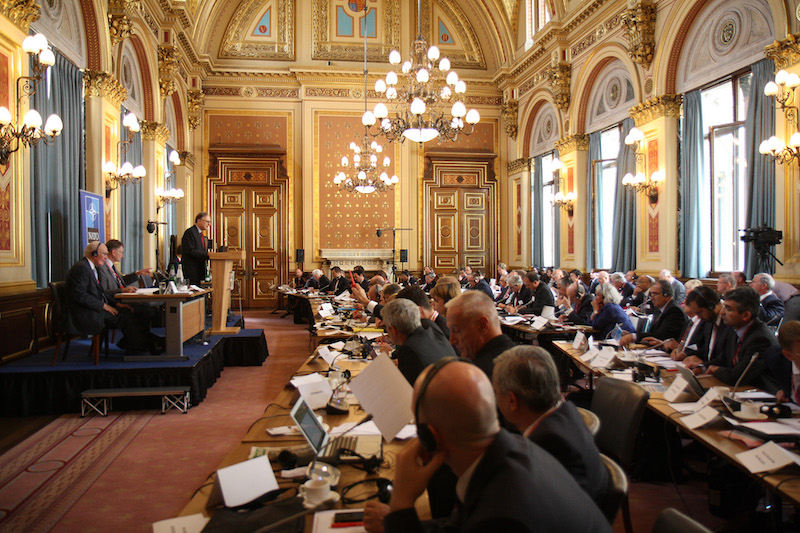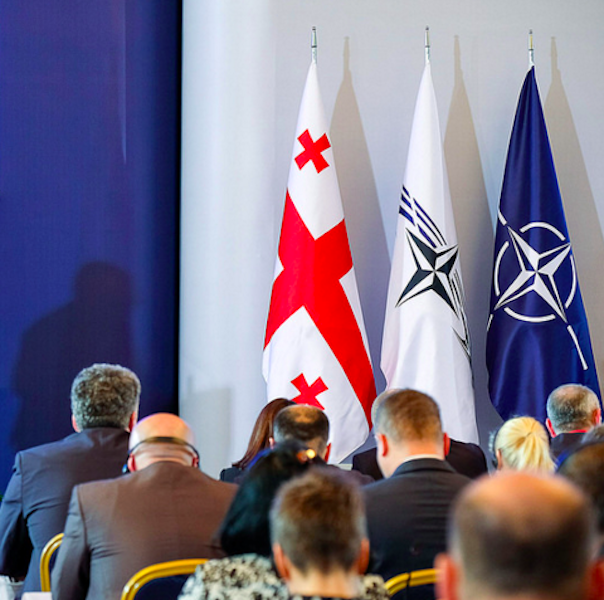The NATO Parliamentary Assembly (NATO-PA) was established in 1955 to provide a forum for members of parliament from NATO member countries to gain a better awareness and understanding of key security issues affecting the Euro-Atlantic area, as well as NATO policies and objectives.
Since the end of the Cold War, NATO-PA has also invited as Associate members parliamentarians from countries wanting association with NATO in order to contribute to mutual understanding and strengthen parliamentary democracy in those countries.
Who participates?
The NATO-PA is made up of 260 delegates from the 29 NATO member countries chosen by their parliaments according to their national procedures. The size of the delegation is based on the country’s size and reflects the political composition of the parliament.
In addition, there are delegates from 12 associate countries, comprised of four Mediterranean associate countries and eight parliamentary observer delegations, bringing the total to approximately 360. Inter-parliamentary assemblies such as the Organization for Security and Cooperation in Europe (OSCE), the Council of Europe and the European Parliament also send delegates.
From time to time, other parliamentary delegations are invited. In the past, these have included delegations from Afghanistan, Pakistan, and other Mediterranean, North African and Middle East countries and parliamentary assemblies.
How is the NATO-PA organized?
The NATO-PA is governed by a Standing Committee which is composed of the Head of each member delegation who are voting members and an Executive consisting of President, five Vice-Presidents, Treasurer and Secretary-General. The President, Vice-Presidents, and Treasurer only vote if they are also the heads of their delegations.
An International Secretariat under the Secretary General is responsible for all administration and most of the research and analysis that supports the Assembly’s Committees, Sub-Committees and other groups.
There are five Committees: Civil Dimension of Security; Defence and Security; Economics and Security; Political; and Science and Technology. They are divided into eight Sub-Committees and their purpose is to examine in detail security and policy challenges facing NATO countries and bring their reports to the Assembly Sessions for discussion and adoption, along with their recommendations, at the Spring and Fall (Annual) sessions held each year in different countries.
Other Assembly bodies include the Mediterranean and Middle East Special Group, the Ukraine-NATO Inter-parliamentary Council, and the Georgia-NATO Inter-parliamentary Council. The NATO-Russia Parliamentary Committee was discontinued in April 2014 after Russia’s military intervention in Ukraine and the annexation of Crimea.
How does it work?
The basic work is done by the committees. They produce reports on critical issues affecting the NATO Alliance at any given time. The Committees and Sub-Committees appoint one of their members as Rapporteur who prepares the report, with the support of the Secretariat. The committees are usually briefed by senior government officials and other experts. They may also organize fact-finding visits to NATO member or partner countries.
The reports are presented and discussed in draft form at the Spring Session within the Committee meetings. They are then revised and updated for discussion, amendment and adoption at the Annual Session in the Fall. The Committees also produce non-binding policy recommendations which are voted on by the whole Assembly and are widely shared with governments and parliaments of the members and associate members.
NATO’s Secretary General provides a written response to each Policy Recommendation.
Associate members participate in most of the activities. They are able to present resolutions and amendments to resolutions and serve as Special Associate Rapporteurs on Committees to ensure that their countries’ views are included in the reports and discussions, but they cannot vote on any of the reports, resolutions, or elections, and they do not contribute to the NATO-PA’s budget.
The Standing Committee provides guidance to the committees to ensure that there is no duplication of topics studied. Both the draft reports and the final reports are posted on the NATO-PA’s website usually two or three weeks before the Session at which they are to be discussed, but the draft reports are considered to be the views of the Rapporteurs only until they are formally adopted at the Fall Session. Nevertheless, the draft reports can provide significant information in a timely manner as they are based on much careful research and analysis which is thoroughly documented.
What is the Rose-Roth programme?
The Rose-Roth programme of cooperation with the parliaments of Central and Eastern Europe (CEE) was initiated in 1990 by then President of the Assembly Congressman Charlie Rose and Senator Bill Roth, and is the central element of the NATO-PA’s outreach efforts. Its initial purpose was to assist partner countries, mainly in the Balkans and South Caucasus, through the post-Soviet transition process, but it has now evolved to include more non-NATO countries.
The programme usually involves two or three seminars a year focused on regional and topical security issues, generally hosted by a country in or near the relevant region. The programme also includes training programmes for parliamentary staff and members of Parliament. Special efforts are made to promote the principle of democratic control of armed forces and parliamentary oversight of defence and the military.
Representatives of the relevant governments, as well as of international institutions such as the OSCE, address the issues at hand and often report on the extent to which the country has progressed in its reform efforts to meet democratic and economic goals.
Are there other programmes?
The NATO-PA also has a NATO Orientation Programme primarily for young or newly elected members of parliament, or those newly assigned to security or foreign affairs responsibility. Held annually in Brussels, the programme provides a thorough overview of the functioning and policies of NATO and its evolving relationship with its many Partners.
In 2001, the Parliamentary Transatlantic Forum, which meets annually in Washington, D.C., was established to explore the differences in transatlantic attitudes, perceptions and policies, and explore how these differences can be resolved.
The Assembly also created a Mediterranean Special Group in 1995. Now named the Mediterranean and Middle East Special Group, this initiative received new impetus following the Arab uprisings. It now involves six countries from the southern and eastern Mediterranean, and its annual activities include a visit to the region and two seminars, to promote political dialogue between parliamentarians, which at the same time informs the members of the NATO-PA of the problems of the region, and provides experience and expertise to the Middle East and North African parliamentarians.
NATO-PA delegations also participate in election monitoring and lead seminars on parliamentary oversight of military and security policy.
While the NATO-PA obviously exists to inform its members, its website makes a wealth of information on a wide range of defence and security issues available to the public.
Photo of a NATO Parliamentary Assembly pre-summit conference in September 2014. Photo courtesy of Wikipedia.
Disclaimer: Any views or opinions expressed in articles are solely those of the authors and do not necessarily represent the views of the NATO Association of Canada.



